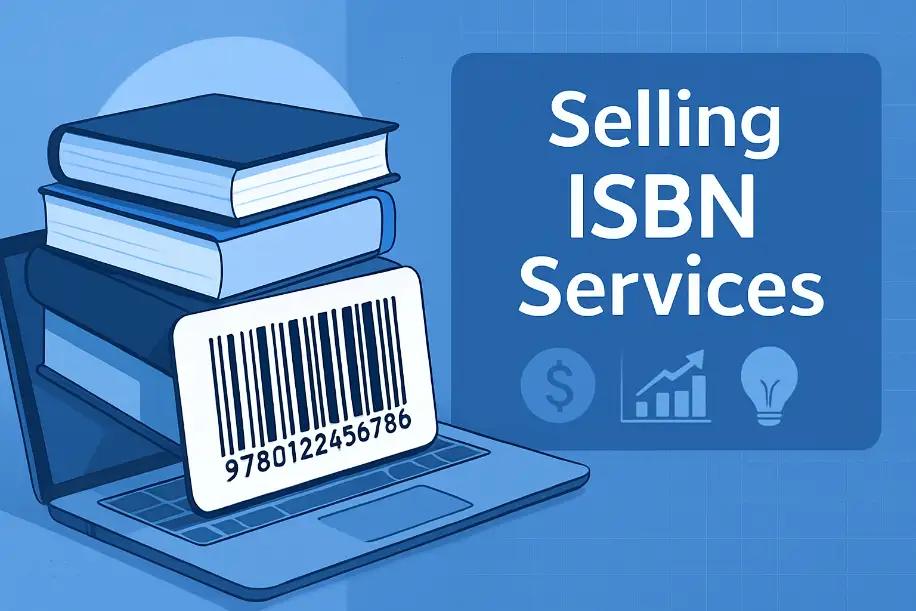The Truth About ISBN Assignment Services: A Guide for Self-Publishing Authors
In the world of self-publishing, few topics generate as much confusion as ISBNs (International Standard Book Numbers). As someone actively…
In the world of self-publishing, few topics generate as much confusion as ISBNs (International Standard Book Numbers). As someone actively engaged in providing ISBN services to authors worldwide, I regularly encounter misconceptions about what ISBN services are, their legitimacy, and their value to self-publishing authors. This post aims to clear the air and help you understand your options.
Understanding the ISBN Hierarchy
Before diving into misconceptions, it’s important to understand how ISBNs are distributed globally:
- GS1 – The global non-profit organization responsible for standardizing goods worldwide
- ISBN International Agency – A non-profit based in London overseeing book standardization
- National ISBN Agencies – One official agency per country (either government-run or privatized)
- Book Publishers – Obtain ISBNs in bulk from their national agency
- Individual Book Titles – Each edition of a book receives its own ISBN
This hierarchy creates a structured system, but also reveals why obtaining ISBNs can be challenging for independent authors.
The Three Paths to Getting an ISBN
Self-publishing authors typically have three options for obtaining ISBNs:
1. Official ISBN Agencies
Purchasing directly from your country’s official ISBN agency gives you complete control. However, this option comes with significant drawbacks:
- High costs – In the US, a single ISBN from Bowker costs $125
- Unnecessary upsells – Many agencies push additional services like barcode generation
- Complex processes – Some countries require extensive documentation and personal information
- Geographic limitations – You’re restricted to your country’s agency
2. Self-Publishing Platforms
Services like Amazon KDP offer “free” ISBNs, but with substantial limitations:
- The platform owns the ISBN, not you
- Your book is published under their generic imprint (e.g., “Independently Published”)
- You cannot use that ISBN on other platforms
- Your publishing options become restricted
3. Third-Party ISBN Assignment Services
This middle-ground option has emerged to address the gaps between the other approaches:
- Lower costs than official agencies (often $39 or less compared to $125)
- Available to authors worldwide, regardless of location
- Simpler process with fewer documentation requirements
- Personal information protection
- Personalized customer support
Addressing the “Gray Area” Misconceptions
One of the biggest misconceptions about third-party ISBN services is that they operate in an illegitimate “gray area.” Let’s clarify some key points:
Misconception 1: “Only government agencies can issue ISBNs”
Reality: While each country has only one official ISBN agency, these agencies can be either government-run or privatized businesses. In countries like the US and UK, the ISBN agencies are private companies.
Misconception 2: “Third-party sellers are illegally issuing ISBNs”
Reality: Third-party services don’t issue new ISBNs. They assign ISBNs that have been legitimately purchased from official agencies. What you’re paying for is the assignment service and the right to use their imprint name, similar to how publishing platforms operate but without the platform restrictions.
Misconception 3: “Books with third-party ISBNs won’t appear in databases”
Reality: ISBN databases only include book information once the book is published, not immediately after ISBN assignment. This is true regardless of how you obtained your ISBN. Most ISBN agencies don’t maintain publicly accessible databases of assigned (but not yet published) ISBNs.
The Value Proposition for Self-Publishing Authors
Why consider a third-party ISBN service? The benefits are substantial:
1. Cost Efficiency
For authors publishing just a few books, the savings are significant. Instead of paying $125 per ISBN, you might pay $39 or less through a third-party service.
2. Global Accessibility
Authors from countries with complex, bureaucratic ISBN processes can access simpler options through international third-party services.
3. Privacy Protection
Some authors prefer not to have their personal details entered into global publisher databases. Third-party services provide a level of privacy protection while maintaining legitimacy.
4. Freedom Without Platform Lock-in
Unlike platform-provided ISBNs, third-party ISBNs can typically be used across multiple distribution channels without restriction.
5. Personalized Support
Many third-party ISBN services are run by small businesses that specialize in supporting independent authors, offering more personalized assistance than large agencies.
How to Verify ISBN Legitimacy
A common concern when using third-party services is verification. Here’s what to know:
- ISBNs follow a mathematical formula that can be validated using online tools
- Reputable services offer money-back guarantees (we offer a 30-day guarantee)
- You can verify the publisher’s imprint in global databases
- Some services provide documentation of the ISBN assignment
It’s worth noting that there are limitations to verification. Most ISBN agencies don’t have publicly accessible databases of recently assigned ISBNs, so immediate verification isn’t always possible regardless of source.
Making the Right Choice for Your Publishing Journey
Choosing how to obtain your ISBN depends on your specific needs:
- If you’re publishing across multiple platforms and want control without high costs, third-party services offer excellent value
- If you’re only publishing on one platform and don’t plan to expand, platform-provided ISBNs might suffice
- If you’re establishing a publishing business with many titles, investing in your own ISBN block from an official agency could be worthwhile
Conclusion
ISBN assignment services fill an important gap in the publishing ecosystem, providing affordable, accessible options for independent authors while operating within the established ISBN framework. While misconceptions exist about their legitimacy, understanding the realities of how ISBNs work reveals that these services offer a valuable alternative for self-publishing authors.
When selecting an ISBN provider, focus on value, legitimacy, and service quality rather than myths and misconceptions. Your publishing journey should be empowering, not hindered by unnecessary complexities or costs.

